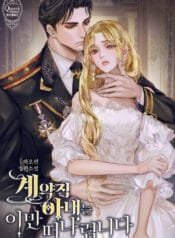The old midwife, who had undoubtedly delivered countless babies in her lifetime, could only shake her head. The despairing husband collapsed at the foot of the bed, weeping uncontrollably.
In this remote part of the countryside, there was no doctor or apothecary to be found. With a woman whose breath was moments from ceasing, there was nothing anyone could do. Even the husband, who had run breathlessly to the church, had not truly expected a miracle.
What Serpino had to do was clear. He walked slowly to the bedside, knelt down and clasped the dying mother’s hand, praying with all his heart. He begged the goddess for mercy and a miracle.
Sunlight streamed brightly through the window. The infant, silent until now, began to whimper and cry. But no miracle came. The woman’s fragile breath soon faded away.
After checking her pulse and breathing, Serpino spoke softly.
“We must call Peter.”
At the mention of the undertaker, the husband’s sobs grew louder. The midwife, too, bowed her head, her shoulders trembling. Serpino stepped quietly out of the house, leaving them behind.
The undertaker he had called came to examine the mother one last time. Peter was both an undertaker and a carpenter, and occasionally sold simple herbal remedies. He nodded silently. Serpino bowed his head and prayed for the departed soul to rest in peace.
There was nothing more that could be done. Serpino stepped outside once again and walked slowly along the dirt road. Yet his duty was not finished. Back at the church, he had to prepare for the funeral; he alone was responsible for conducting them in this land.
Here, death came too often and too close for grief to linger each time. He could not begin to imagine what it felt like for a mother to leave her newborn baby behind. Nor could he be certain that the father would find the strength to raise the child alone.
At that thought, Serpino halted mid-step. Then he turned back and retraced his steps to the hut. The midwife, tidying up inside, looked up at him in confusion.
His gaze shifted to the basin she held.
“Please bring some fresh water. I will baptize the child before I leave.’
“Ah, yes. If you could do that…”
The old woman brightened at once and hurried to draw water from the well. Her husband, still in tears, clumsily lifted the child into his arms.
Without delay, Serpino baptized the infant, who had no name yet. It was a fragile life, brought into the world through a harrowing birth. For now, the child seemed healthy, but without its mother’s milk, its chances of survival were half those of any other child.
As a priest, all Serpino could do was offer a swift baptism. He prayed earnestly for this tiny life to be spared. Yet reality was merciless. If the infant’s journey ended in vain, he prayed that the child would not wander, but return straight into the goddess’s embrace.
Having passed its first trial between life and death, the newborn wriggled its tiny hands. Before leaving the hut, Serpino offered his final advice:
“If caring for the child alone becomes too much, you can always come to the church.”
“Yes, thank you…”
Sniffling, the man replied. Only then did Serpino take his leave. He felt not relief, but resignation. After all, there was nothing more he could do.
Instead of returning directly to the church, he headed towards the nearby village. The midday sun beat down on his head as he walked. He went from house to house, visiting expectant mothers, children, the sick and the recently bereaved. He knocked at each doorstep.
The weary poor welcomed their priest’s visits with open arms. Even though he could only offer them prayer, they felt as though they had finally been touched by the hand of God. They were comforted and grateful, and faint smiles softened their lined faces. Serpino clasped their rough hands and prayed for peace.
Yet none of this could erase the helplessness of losing a life that morning. By the time he returned to the church, a group of children were waiting for him. They were the fortunate ones, from slightly better-off families. Teaching them their letters and simple numbers was one of the priest’s duties, in the hope that they might someday enjoy a less harsh life than their parents did.
The rest of the day passed without incident. He spent some time recording births and deaths, and reviewing the church’s meagre accounts. From time to time, those who came seeking him received the rites they required. While performing a brief coming-of-age ritual for one villager, his thoughts wandered to a young woman who had come of age the previous month:
The noble lord’s daughter. Her ceremony had been held on an unprecedented scale. In a banquet hall adorned with splendor, the rite had been conducted just for her. Serpino had travelled to the castle himself to bestow the blessing, though for someone born with every privilege, the goddess’s grace seemed scarcely necessary.
“Thank you, Father.”
Dressed in expensive silks and sparkling jewels, she smiled radiantly, surrounded by the lavish gifts of her fiancé. An orchestra, handsomely paid, had crossed the mountains to play beautiful music, while long tables were piled high with wine and meat.
For a moment, Serpino compared her life of extravagance with the people’s misery. Then he shook his head. Such thoughts served no purpose. If he showed even the slightest hint of them when meeting her in person, it would only cause trouble. He quietly returned to his duties.
When he was finally alone, Serpino sank into silent meditation. In truth, his prayers of late had become more about repentance than devotion. Time and again, he chastised himself for doubting God’s omnipotence whenever confronted by the immovable wall of reality. Every trial had divine intent. The hardships endured by his flock and himself were undoubtedly tests arranged by God.
When he had finished praying, Serpino left the church to fulfil his duties. Yet his steps dragged, reluctant and heavy, as though he were walking through sand. Although visiting the Lord’s castle was part of his calling, he could never grow accustomed to it.
Nevertheless, the distance was not great. Soon, Serpino was standing at the gates of Castle Cardini, looking up at its spire. The fortress appeared unremarkable from the outside. However greedy the Count might be, there were limits to what could be extracted from a destitute domain. If the people starved, there would be no harvest the following year. For this reason, the castle’s exterior had undergone little more than modest repairs, and its weathered stones preserved much of the old structure.
The interior, however, told a different story. As soon as Serpino stepped inside, he frowned. While the outer walls remained plain, the halls within glittered with excess, rivalling even the royal palace. His eyes were immediately drawn to the vast family portrait displayed in the centre of the entrance hall.
It depicted Count Cardini with his two grown-up children. Commissioned at great expense from a capital city artist, the painting was exquisite — yet Serpino always felt uneasy when he faced it. It was as though he was looking not at the living, but at the shades of the dead.
Only the woman on the right seemed different. Her hair was black as midnight, and her eyes were red as blood. She was so lifelike that Serpino half-feared she might step down from the canvas. Yet she bore no resemblance to any ordinary human being. She looked more like a mythical creature: a spirit or goddess in human form.
With an effort, Serpino turned away, forcing himself to ignore the image. A man consecrated to God could not allow himself to be swayed by such instincts. With reluctant steps, he continued down the hall towards the audience chamber.
Even the corridors blazed with opulence. Windows glittered with glass as clear as spring water, and perfumes as delicate as blossom laced the air. Statues of ancient gods and heroes stood at every corner, yet there was not a single tribute to the goddess who watched over this land. To Serpino, the display was decadent and perilously close to sacrilege.






